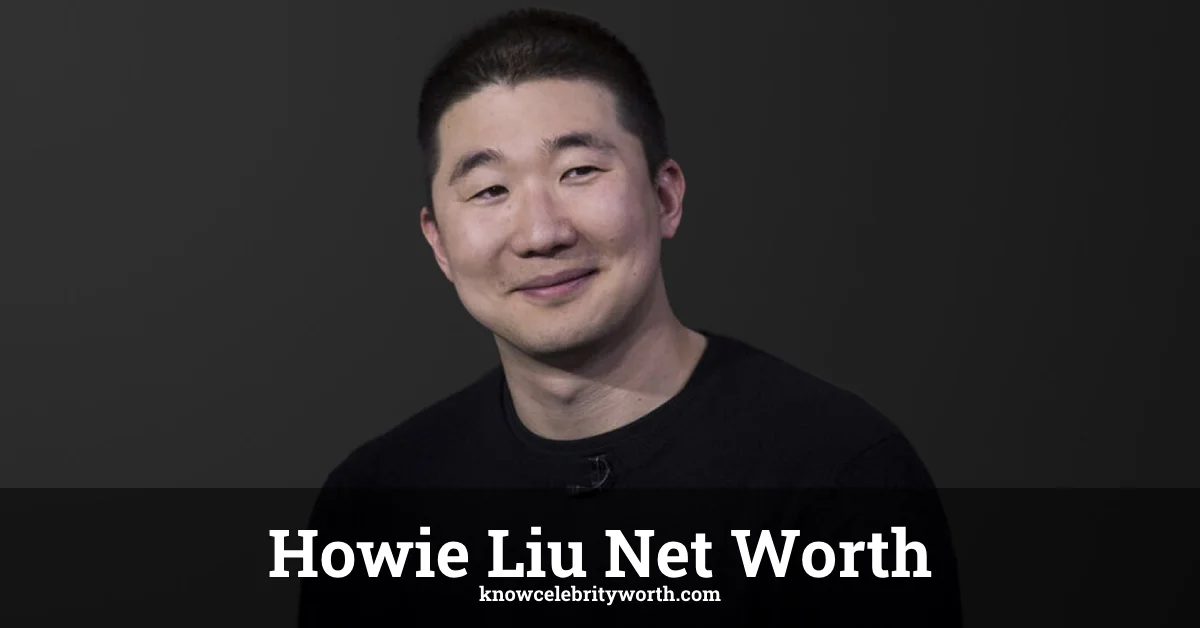From coding at 13 to building a software giant worth billions, Howie Liu’s path to wealth shows what happens when talent meets opportunity. The co-founder and CEO of Airtable has built his fortune through smart business moves and a vision for making complex software more user-friendly.
Howie Liu Net Worth
Howie Liu started coding when he was just 13 years old. Unlike many tech stars who dropped out of college, Liu finished his education at Duke University. His parents, who came to America from China, taught him the value of hard work and creative thinking.
What makes Liu stand out in Silicon Valley is how he built his wealth step by step. He didn’t just get lucky once – he created value twice. First with his company Etacts, and then with the much bigger success, Airtable.
“I was always drawn to building things that solve real problems,” Liu once mentioned in an interview. This problem-solving mindset helped him spot gaps in the market that others missed.
Career
Liu’s wealth journey began with Etacts, a customer relationship management tool he created with his college friend Evan Beard. They started the company in 2010 when Liu was just 21 years old.
Etacts caught the attention of big players in tech quickly. The startup raised money from Y Combinator, a famous startup accelerator that helped companies like Airbnb and Dropbox grow.
Less than a year after starting Etacts, Liu sold the company to Salesforce. While the exact sale amount wasn’t made public, this deal gave Liu his first taste of tech wealth and valuable connections in Silicon Valley.
The money from this sale became Liu’s starting capital. More importantly, working at Salesforce after the sale taught him lessons about enterprise software that would later help him create Airtable.
Airtable Revolution
In 2013, Liu took a big risk. He left his job at Salesforce to start Airtable with friends Andrew Ofstad and Emmett Nicholas. They shared a vision of making database technology accessible to everyone – not just technical people.
Their timing was perfect. Businesses needed more flexible tools that non-programmers could use. Airtable filled this gap by combining the simplicity of spreadsheets with the power of databases.
The company started slowly. Liu believed in building a solid product before chasing rapid growth. This patient approach paid off as Airtable gained loyal users who spread the word about the product.
Major funding came in 2018 when Airtable raised $100 million, valuing the company at $1.1 billion. This made Airtable a “unicorn” – a startup worth over a billion dollars – and transformed Liu’s paper wealth almost overnight.
Calculating Liu’s exact net worth involves looking at his ownership stake in Airtable and his other assets. Financial reports suggest Liu owns about 10% of Airtable following multiple funding rounds.
With Airtable’s current valuation at approximately $11.7 billion, Liu’s stake would be worth around $1.17 billion on paper. This makes up the largest portion of his wealth.
Compared to other tech founders at similar stages, Liu’s wealth growth follows a common pattern. Like many founders, his paper wealth grew each time Airtable raised money at higher valuations. The difference is that Liu managed to keep a meaningful stake despite multiple funding rounds.
While many founders see their ownership drop below 5% after several funding rounds, Liu has reportedly maintained a larger portion. This smart move preserved his wealth as the company’s value grew.
$31 Million Howie Liu House in Beverly Hills
In 2021, Liu purchased a stunning home in Beverly Hills for $31 million. The mansion sits on 1.2 acres of land and offers breathtaking views of Los Angeles.
This purchase shows how Liu has started to turn some of his paper wealth into tangible assets. Real estate often serves as a wealth diversification strategy for tech entrepreneurs who have most of their net worth tied up in company stock.
The Beverly Hills property features 6 bedrooms, multiple living spaces, and luxury amenities. While this represents a significant purchase, it’s still a relatively small portion of Liu’s overall wealth.
Tech executives often buy high-end real estate not just as homes but as investments. Property in premium locations like Beverly Hills typically holds value well over time, making it a smart addition to Liu’s wealth portfolio.

Investments
Beyond Airtable, Liu has put money into other startups as an angel investor. While the full list of his investments isn’t public, reports show he’s backed promising tech companies in their early stages.
Angel investing serves two purposes for successful founders like Liu. First, it helps diversify their wealth beyond their main company. Second, it keeps them connected to innovation happening across the tech industry.
Liu seems to favor investing in software companies, especially those making complex tools more user-friendly – similar to what he did with Airtable. This pattern shows he invests in areas where his expertise can add value beyond just money.
The returns from these investments likely make up a smaller but growing portion of Liu’s overall wealth. As these startups grow or get acquired, Liu’s initial investments could multiply in value.
Net Worth Growth Timeline
Liu’s wealth has grown in clear stages that track alongside his business achievements:
- 2010: Liu gets his first significant money from selling Etacts to Salesforce. While not enough to make him rich by Silicon Valley standards, this gave him the financial freedom to start his next venture.
- 2013-2018: During Airtable’s early years, Liu’s wealth existed mostly on paper as the company raised initial funding rounds. By 2018, when Airtable reached unicorn status with a $1.1 billion valuation, Liu’s net worth likely crossed into the hundreds of millions.
- 2019-2021: Airtable’s growth accelerated during the pandemic as remote work increased demand for collaboration tools. Multiple funding rounds pushed the valuation to $5.77 billion, multiplying Liu’s paper wealth.
- 2022-Present: Despite tech industry challenges, Airtable has continued growing its enterprise focus. The latest valuation of $11.7 billion has further boosted Liu’s net worth to its current estimated level.
Recent business moves at Airtable show Liu’s focus on long-term value over short-term gains. In December 2022, Airtable laid off about 20% of its staff (254 employees) as part of a strategic shift toward enterprise customers.
Liu explained this difficult decision as necessary to focus resources on bigger clients who bring more stable revenue. While painful in the short term, this move aimed to make Airtable stronger financially.
The shift toward enterprise clients could impact Liu’s wealth positively if it leads to more predictable revenue. Enterprise customers typically sign longer contracts with higher values, which investors value highly.
Another major wealth factor for Liu will be whether Airtable goes public through an IPO. If this happens, Liu would be able to sell some shares while potentially seeing the company’s value increase even further in the public market.
How Liu Makes Money?
Liu’s wealth comes primarily from his equity in Airtable. This isn’t cash in the bank but ownership that grows in value as the company grows.
As CEO, Liu also receives a salary, though tech founders often take relatively modest salaries compared to their equity stakes. The exact figure isn’t public, but typical CEO salaries at companies of Airtable’s size range from $200,000 to $500,000 annually.
Secondary income likely comes from:
- Returns on his angel investments in other startups
- Possible dividends or interest from more traditional investments
- Potential board positions or advisory roles at other companies
Liu seems to follow the typical tech founder pattern of keeping most wealth tied to his company while gradually diversifying into real estate and other investments as his net worth grows.
1. Airtable’s AI Integration
The company has been adding artificial intelligence features to its platform. If these additions help Airtable stand out in a competitive market, it could drive the company’s value higher.
2. Market Position
Airtable operates in the growing “no-code/low-code” space that lets non-programmers build software. As this market expands, Airtable’s position as an early leader could bring huge returns.
3. Potential IPO
If Airtable goes public, Liu would have a chance to convert some of his paper wealth to cash while potentially seeing his remaining shares rise in value on the public market.
4. Competition
Tools from big players like Microsoft and Google compete with Airtable in some ways. How Airtable maintains its unique value against these giants will affect Liu’s long-term wealth.
The tech industry’s overall health will also play a role. After a difficult 2022-2023 period with layoffs and reduced valuations across tech, how the sector rebounds will impact Liu’s wealth trajectory.
Conclusion
What stands out about Liu’s path to wealth is his patient approach. Unlike founders who chase rapid growth at all costs, Liu built Airtable methodically over years. This “slow and deliberate” strategy has created more sustainable value.
At just 34 years old, Liu has potentially decades ahead to grow his wealth further. His combination of technical skills, business sense, and investor relations has proven powerful so far.
His story shows that in tech, wealth often comes to those who solve real problems in new ways. By making database tools accessible to everyone, Liu created value that translated into personal wealth.
For those interested in tech entrepreneurship, Liu’s journey offers valuable lessons about patience, problem-solving, and the power of making complex technology more accessible. His wealth didn’t come overnight but through years of building something truly useful.
As Airtable continues evolving and potentially moves toward an IPO, Liu’s wealth story is still being written. What’s clear is that by solving a genuine problem in the software world, he’s built not just a valuable company but also a personal fortune estimated in the billions.
